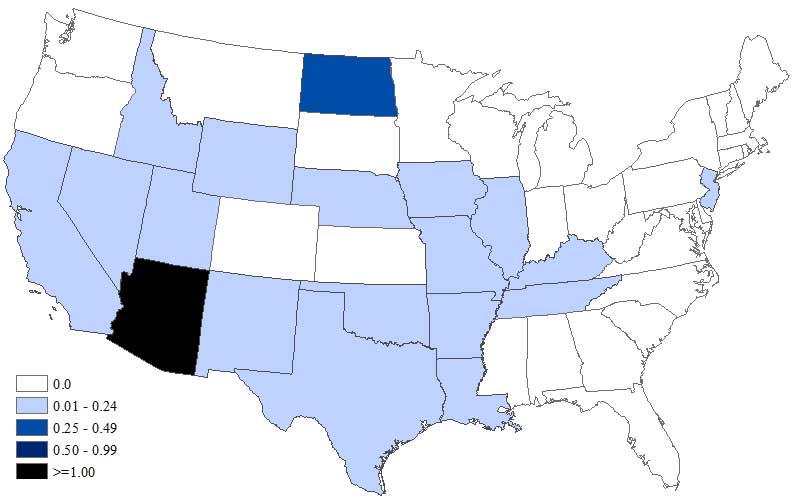West Nile scare tactics
Heartfelt or hype? Radio ads focus on worst-case scenario
By Tom Polansek
STAFF WRITER
Bob Brookman's wife fell into a coma and died after being bitten in September 2002 by a mosquito carrying West Nile virus.
He now is the voice on a radio ad being played throughout the Chicago area that warns people to stay inside or protect themselves with insect repellent.
"My wife and I were sitting in our back yard, and she was bitten by a mosquito," Brookman, who lives in Chicago, says in the public service announcement. "Thirteen days later, she basically suffered paralysis, went on a feeding tube and a respirator, and was in that condition for 13 months before she succumbed to the West Nile virus."
The ad, sponsored by the Illinois Department of Public Health, highlights the worst possible scenario for those infected with the disease.
But no deaths in Illinois have been linked to West Nile so far this year, and public health officials report that the disease has been confirmed in only 18 people in the state.
With those figures in mind, the dramatic tale has left some wondering whether the state is fueling unnecessary paranoia about the disease.
Indeed, officials within the department report that, of those bitten by mosquitoes infected with West Nile, only about two out of 10 will ever experience any symptoms. And a statement released Wednesday by the department, which announced two new cases in Cook and DuPage counties, conceded that most medical problems related to the disease are minor.
"Illness from West Nile disease is usually mild and includes fever, headache, and body aches," the statement reads.
State defends campaign
Nevertheless, the department defends its ads as an important educational tool.
Spokeswoman Tammy Leonard said the state wanted to encourage people to protect themselves and avoid the high number of West Nile-related fatalities it saw in 2002. That year, Illinois led the nation with 884 human cases and 67 deaths.
"We don't want to see a repeat of that ever, especially when people can take precautions to being bit by a mosquito," Leonard said.
In 2003, the number of human cases dropped to 54, with just one death, according to the department. Infections were back up slightly in 2004 with 60 human cases and four deaths.
For Brookman, it is impossible to overstate the seriousness of the disease. He lauded the department for publicizing what happened to his wife, Maureen, and said people need to understand the risks of West Nile.
He was paid for his work but said he donated the money to charity.
"I think public health agencies were trying to avert public panic (in 2002) and were underplaying the number of cases and also the seriousness of the illness," he said in an interview. "I think they've come to realize that's not the way to approach this thing. A little bit of panic might go a long way, and I certainly hope it does."
The radio ads featuring Brookman made their first run in 23 markets statewide from June 29 to July 22. They then were suspended until Aug. 7, when they returned for another run through Sept. 1.
Leonard said the most recent run will be heard only in the Chicago area, as reports of the disease have been centered in Cook, Kane and DuPage counties. Locally, listeners can hear them on WLS and WGN.
Cautions against complacency
And, despite the slow start to the West Nile season this year, local health experts cautioned people not to become complacent.
Sallie Rivera, epidemiology coordinator at Sherman Hospital in Elgin, said a high number of birds and mosquito samples have tested positive for West Nile and those cases could easily be transferred to humans.
"If you want to be cute about it, it's only a bite away," she said about West Nile.
Rivera urged people to wear long pants and long-sleeved shirts when they go outside and apply insect repellent with DEET. As for the ads, she agreed they were scary.
"It's really a dramatic thing," Rivera said about Brookman's story. "I don't know if that's good for us or bad for us. Not all people will get that sick, but people will get sick."
-Staff writer Mike Danahey contributed to this report.
8/18/05
News Clips and Information on West Nile Virus Survivors. Videos and links to News Articles on West Nile Virus Families, West Nile Deaths, West Nile Virus Prevention and West Nile Virus Symptoms
Subscribe to:
Post Comments (Atom)
CDC West Nile Virus Info
Skip directly to page options Skip directly to A-Z link West Nile Virus Neuroinvasive Disease Incidence by State 2019 West Nil...

-
Teenage girl in Menifee dies after four-year battle with West Nile illness Download story podcast 10:00 PM PST on Wednesday, December 10...
-
Skip directly to page options Skip directly to A-Z link West Nile Virus Neuroinvasive Disease Incidence by State 2019 West Nil...
-
Tosa man battling West Nile dies Steiner was principal of Wauwatosa West High School By KAWANZA NEWSON knewson@journalsentinel.com Posted: N...

No comments:
Post a Comment